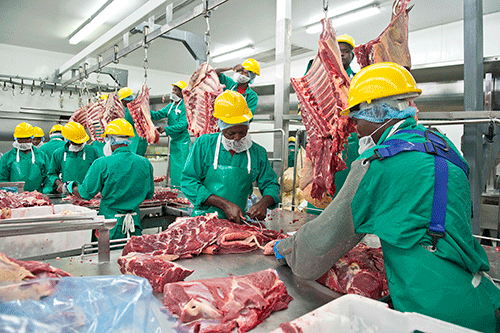It is an open secret that Meatco finds itself between a rock and a hard place, gasping for breath like a dying cow, but it must not be killed, for now, says the Namibia National Farmers Union.
This position was offered by the union’s acting president Amon Kapi, in an interview recently with New Era.
The discussion also touched on NNFU’s position on the controversial veterinary cordon fence (notoriously known as the
red line), Meatco’s collapse, and the treatment of black farmers in general.
It is Kapi’s position that the bleeding parastatal must be rescued by any means necessary.
His comments come at the back of agriculture minister Calle Schlettwein’s remarks that the meat corporation is technically in the intensive care unit (ICU).
Government, Schlettwein said, proverbially must decide to terminate its life support system, or breathe new life into its ailing operations.
It is a catch-22 scenario for government.
Not so long ago, the government found itself in a position where it had to choose between pumping millions into the now- defunct Air Namibia, or liquidating it.
Despite the general public’s condemnation, the government went ahead and liquidated the national carrier, which had been described as a ‘bottomless pit’ that was draining taxpayers’ money, with little to nothing to show for it.
Meatco, however, cannot be lumped together with Air Namibia or any other struggling public entity, Kapi said.
“We must look for ways to rescue Meatco as liquidation is not an option… we all know that over the years, things were working at Meatco, and it never asked for government bailouts. So, it’s too soon to have that discussion,” he cautioned. Responding, Meatco CEO Mwilima Mushokabanji agreed with the union, saying it was premature to even talk about liquidation.
“The discussion on liquidation should not even be on the table,” he said explicitly.
The executive said the entity had been trapped in historical debt “with FNB and Bank Windhoek”, which it has since paid off.
According to him, it is through Meatco’s recent strategy that northern farmers today have markets as far as West Africa, Ghana to be precise.
Meatco is also working on a strategy to expand Namibia’s beef export to the Middle East. Meatco, he continued, came to the rescue of farmers during the drastic droughts of
2019 when it made a profit of N$1.7 billion, of which around N$1.3 billion was paid to producers (farmers).
“Meatco is crucial,” he stressed..
The NNFU, Kapi said, wants a seat at the high table and to be counted, as they have been sidelined for far too long.
“Meatco is the only public livestock market for the farmers, and we cannot allow the organisation to go down the drain. We cannot allow our farmers to suffer because of poor management and lack of integrity,” he said in a missive.
According to him, Meatco is sidelining communal farmers south and north of the red line.
“Meatco is using the name of communal farmers south and north of the cordon fence when requesting for government guarantees and support. But the funds are actually used
to cover inefficiency in its operations and paying unjustifiable higher prices to commercial farmers,” Kapi said in a separate statement, seen by New Era.
“Meatco has only operated in Katima Mulilo for the last three years, yet received government guarantees and equity for support to the northern communal areas (NCAs). Meatco received more than half a billion in combination of a government guarantee and equity in the last four years,” he added.
It is disheartening that farmers north of the red line are left to fend for themselves, he continued, saying there are no operational abattoirs in Oshana, Kunene and the two Kavango regions.
“The government has constructed and renovated abattoirs in the NCAs, supposed to be operated by a public entity, but almost nothing is happening. Construction and renovation of abattoirs, government guarantees and equity are taxpayers’ money, hence cannot be abused on inefficiencies”,
the union fumed.
Kapi further alleged that “Meatco is in the process of dissolving the NCAs’ subsidiary, which is the only means to serve the northern farmers. No consultation with farmers, but currently doing it secretly. Same Meatco pulled out of the NCAs in 2015, leaving northern regions without a market.”
On the controversial red line, NNFU is yet to decide whether or not the cordon fence must be removed. “We are still consulting with our members, and will soon have a position on the red line,” he said. The Veterinary Cordon Fence (VCF) or red line is a border between north and south, which is used as an animal disease control mechanism.
Over the years, farmers in northern Namibia have complained about the existence of the VCF, compounded by poor marketing opportunities, grazing management, stock theft and lack of funding.
Other challenges include the poor viability of abattoirs, which leads to uncompetitive market prices, climate change, and the high cost of production.
Late last year, the NNFU pointed to the untapped potential for the NCAs’ market, a relatively large herd size finding itself in a
huge informal market.
There are an estimated 1.5 million cattle in the NCAs.
NNFU’s study also called for the expansion of the Foot and Mouth Disease (FMD) free zone. The zone will enable NCAs which have not recorded FMD cases in decades to have access to the lucrative markets south of the red line and others such as South Africa and the European Union (EU).
“The creation of a new FMD-free zone will lead to increased cattle prices, which would eventually lead to increased revenue for farmers. The study also highlighted non-monetary benefits of creating an FMD-free zone, such as employment and new markets creation,” stated the union.
The NCA covers parts of the Kunene, Omusati, Oshana, Ohangwena, Oshikoto, Kavango West, Kavango East and Zambezi regions. Along with South Africa and Botswana, Namibia is one of the biggest beef exporters to the EU. – emumbuu@nepc.com.na



